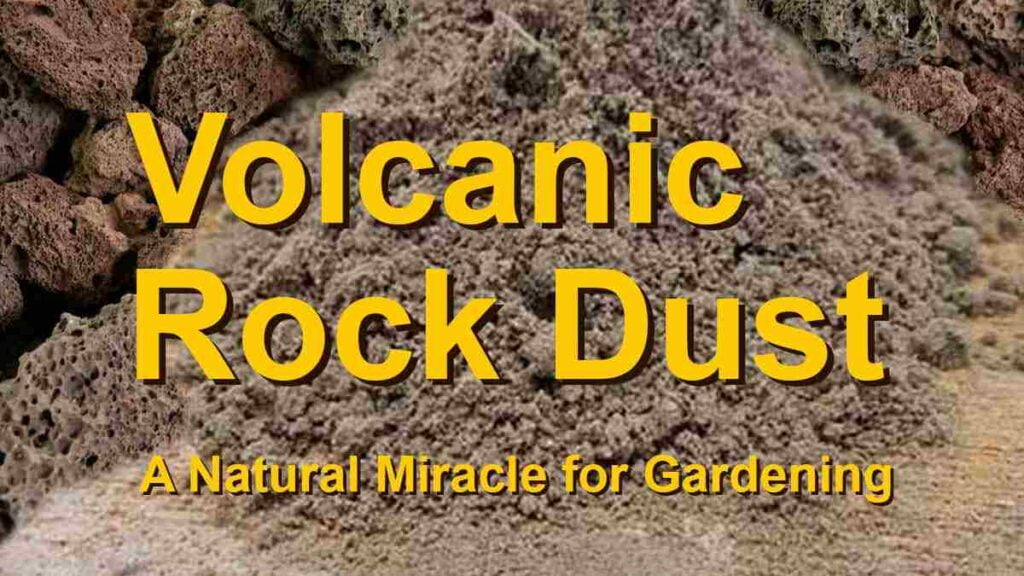Volcanic rock dust also known as volcanic ash or rock powder. It is a natural soil amendment made from finely ground volcanic rock material that results from volcanic eruptions. It is a complex mixture of minerals such as silicon dioxide, calcium, iron, magnesium, potassium and trace elements like zinc, copper and molybdenum. This type of rock dust is highly valued in gardening and agriculture due to its rich mineral composition and numerous benefits for soil and plant health. The following is a detailed overview of volcanic rock dust including its mineral composition, properties, typical analysis and benefits for gardening.
Mineral Compositions
Volcanic rock dust is derived from various types of volcanic rocks such as basalt, andesite and pumice. These rocks are rich in a wide range of essential plant nutrients and trace minerals, including:
- Silica:
Silica is essential for plant growth as it strengthens cell walls and helps plants resist stressors like pests and diseases. - Calcium:
Calcium is crucial for root development, cell division and overall plant structure. - Magnesium:
Magnesium is a central component of chlorophyll the molecule that allows plants to photosynthesize effectively. - Iron:
Iron is necessary for chlorophyll formation and photosynthesis and it aids in the transport of oxygen within plants. - Potassium:
Potassium is vital for regulating water uptake, nutrient transport and overall plant metabolism. - Trace Minerals:
Volcanic rock dust also contains trace minerals like zinc, copper and manganese which are essential for various enzymatic processes in plants.
Properties
Volcanic rock dust is typically ground into fine particles, which can range from a few microns to several millimeters in size. It is often gray or reddish-brown in color and has a gritty texture.
Typical Analysis
The exact mineral composition of volcanic rock dust can vary depending on the source rock. However, a typical analysis of volcanic rock dust might include:
Benefits Of Volcanic Rock Dust In Gardening
Volcanic rock dust offers several advantages for gardening and agriculture:
- Improved Soil Fertility:
The rich mineral content of volcanic rock dust enhances soil fertility by providing essential nutrients. This helps balance soil pH and provides a steady supply of minerals for plant uptake leading to healthier and more productive plants. - Enhanced Soil Structure:
Volcanic rock dust can break up compacted soil, improve aeration and increase water retention. This results in better soil structure, root growth and overall plant health. - Disease Resistance:
Plants grown in soils enriched with volcanic rock dust often exhibit increased resistance to pests and diseases, thanks to the improved nutrient availability and strengthened cell walls. - Heavy Metal Detoxification:
Volcanic rock dust can bind to heavy metals in the soil reducing the risk of heavy metal toxicity in plants. This is particularly beneficial for urban gardens or areas with contaminated soils. - Increased Nutrient Density:
Plants grown in soil amended with volcanic rock dust tend to have higher nutrient content making the produce more nutritious for consumption.
In summary, volcanic rock dust is a valuable soil amendment due to its rich mineral composition and numerous benefits for gardening. It enhances soil fertility, improves soil structure, as well as boosts plant health and resistance. Also, it can help detoxify contaminated soils making it a valuable tool for sustainable and productive gardening practices.
How To Use Volcanic Rock Dust In Your Garden
- Application Methods:
There are various ways to apply volcanic rock dust in your garden. You can mix it directly into the soil when planting or sprinkle it on the surface of the soil. You can also create a liquid solution by dissolving it in water and use it as a foliar spray. - Dosage Recommendations:
The recommended dosage may vary depending on the type of plants you are growing and the condition of your soil. However, a general guideline is to apply 2-5 pounds of volcanic rock dust per 100 square feet of garden.
Conclusion
In conclusion, volcanic rock dust is a natural miracle for gardening. It enhances soil quality, promotes healthy plant growth and reduces the reliance on chemical fertilizers. By using this sustainable and eco-friendly solution gardeners can create bountiful and vibrant gardens. If you’re ready to elevate your gardening experience consider incorporating volcanic rock dust into your routine.
FAQs
Is volcanic rock dust safe for organic gardening?
Yes, volcanic rock dust is considered safe for organic gardening and is an approved input in organic farming practices.
How often should I apply volcanic rock dust to my garden?
The frequency of application depends on the specific needs of your plants and soil. Generally, an annual application is sufficient but you may choose to apply it more frequently if necessary.
Can volcanic rock dust be used in potted plants?
Yes, volcanic rock dust can be used in potted plants to improve soil quality and provide essential minerals.
Are there any plants that don’t benefit from volcanic rock dust?
While most plants benefit from volcanic rock dust, some specialized plants with very specific soil requirements may not need it.
Does volcanic rock dust have an expiration date?
Volcanic rock dust does not have an expiration date if stored in a cool, dry place. It remains effective for an extended period.
Can volcanic rock dust replace chemical fertilizers entirely?
While volcanic rock dust offers many benefits, it may not entirely replace chemical fertilizers in all cases. It’s often used in conjunction with other organic gardening practices.
Are there any side effects of using volcanic rock dust?
When used correctly there are typically no adverse side effects of using volcanic rock dust. However, overapplication may lead to excessive mineral content in the soil.
Also Read
Granite Rock Dust: Boosting Soil Health and Plant Growth Naturally
Limestone Dust Used In Gardening And Agriculture
Dolomite Dust : A Natural Soil Amendment

